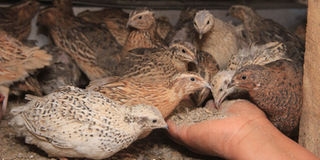Quail farmers facing challenges as market saturates

A quail farmer in Nyeri feeding her birds. With more people venturing into quail farming, new challenges are emerging as the market for the birds and their eggs saturates. Paul Gichohi, a quail farmer from the Mount Kenya region is quick to say that quail farming is the in-thing and not a pyramid scheme by any chance. PHOTO|JOSEPH KANYI.
What you need to know:
- According to Paul Gichohi, a quail farmer from the Mount Kenya region, there are challenges in quail framing although no other bird does this well currently.
- The quail farmer said those who failed to survey the market before investing huge sums of money into the scheme are risking losses.
- Mr Gichohi is quick to say that quail farming is the in-thing and not a pyramid scheme by any chance.
- A mature Japanese quail weighs 160g and takes no more than 30g of feeds daily.
Quail farming has become quite a craze in Kenya as many hope to make good money from the business.
But Kenya is not the first country to practice quail farming in large scale.
In continents like Australia quail farming began in 1970.
Game Farm, the largest producer of quails in Australia, started their business in 1975 producing about 3.55 million birds annually with an average of 296,000 birds per month or 9,900 birds per day.
However, there is no business venture without its downside.
According to Paul Gichohi, a quail farmer from the Mount Kenya region, there are challenges in quail framing although no other bird does this well currently.
“Other birds must be pretty envious of quails as they are the most talked about in the country,” he quips.
MARKET GETTING SATURATED
Mr Gichohi who boasts of over 1,200 quails noted that the birds’ market is currently posing a great challenge as it is getting saturated.
The quail farmer said those who failed to survey the market before investing huge sums of money into the scheme are risking losses.
“The unprecedented upsurge in demand for quails in recent months has clearly moved entrepreneurs across the country to risk venturing into the somewhat new business.
Cautious investors who surveyed the market prior to venturing have clearly raked in millions as the business was not as flooded as it is now.
“Many are still getting into it in a big way without surveying the local market. They may not recoup their investments if they are not careful,” Mr Gichohi warned.
EXPORT MARKET
He suggested that new farmers should go slow and think of the export market which has greater potential.
Solomon Mwaura, a quail farmer from Ridgeways, Kiambu County, is counting losses but he is not giving up anytime soon.
Mr Mwaura, a 23 year old student said he invested close to half a million shillings to uncover the gold under the new ‘million-dollar’ business.
He borrowed Sh200,000 from his father and elder brother to purchase two incubators for his ‘golden eggs.’
“One incubator has a capacity of holding 1,326 eggs and together they hold 2,652 eggs,” says the student who adds that he has sacrificed much of his school time to take care of the birds.
He says the main challenges facing him are diseases and a ready market for his products.
“As from December 28, 2013 to date I have only sold 10 eggs at Sh20 each.
I had expected to sell an egg at a minimum price of Sh60 and a mature chick at Sh600,” he says.
I collect around 50 eggs in a day and I have been forced to put some in the incubator to avoid spoilage.
I have been eating others for I am left with no choice,” said Mwaura.
DIE AFTER HATCHING
He further says that some of the quails die soon soon after hatching. Most die before they are two weeks old.
He says he lost about 100 birds from his first acquisition of 600 birds.
“I in a span of one month I lost 100 birds soon after hatching. I also lost 50 mature ones.
When I ventured into the market an egg was going for Sh100 while mature chicks sold for about Sh1,000 but now I am counting losses of close to Sh200,000.
However, he says he is not giving up any soon.
He says he is considering going for the export market where he says demand is currently high.
“I intend to produce at least 1000 eggs weekly because I hear an egg exported to Dubai markets could fetch me Sh1,000.
Maybe then, my investment would bring better returns,” he said.
COMMON SPECIES
The most commonly reared species of quails in Kenya’s commercial enterprises is the Corturnix Corturnix japonica, commonly known as the Japanese quails and is found in most quail farms in the country.
This species produces an average of 280 eggs per hen annually and if a male to female ratio of 1:3 is observed, the hatchability is over 70 per cent.
Mr Gichohi actually says that if you maintain cleanliness and handle the incubator well, the hatchability is 90 per cent.
They mature after six weeks.
A mature Japanese quail weighs 160g and takes no more than 30g of feeds daily.
Mr Gichohi is quick to say that quail farming is the in-thing and not a pyramid scheme by any chance.
“Go right into it fearlessly and scale the heights to as high as you can possibly get.
The largest producer of quails in Kenya that I have seen so far has about 10,000 birds and is doing well,” he said.





